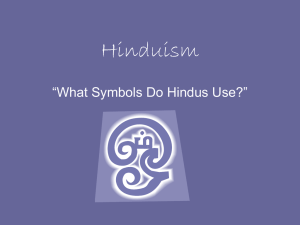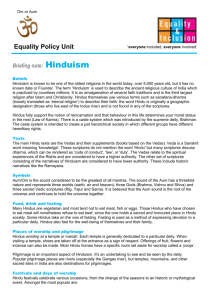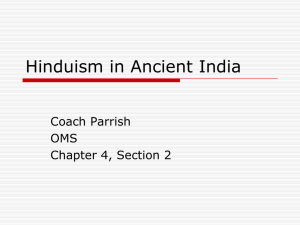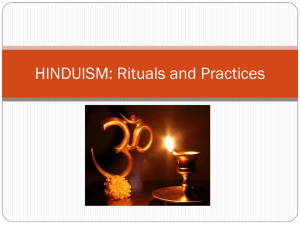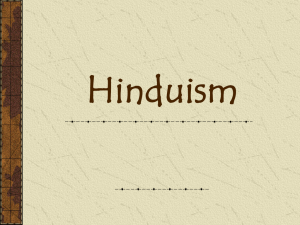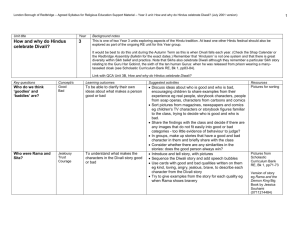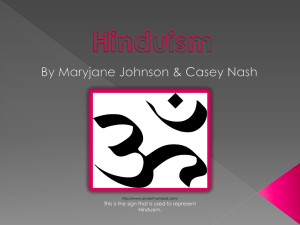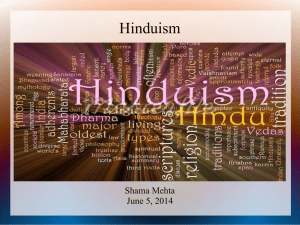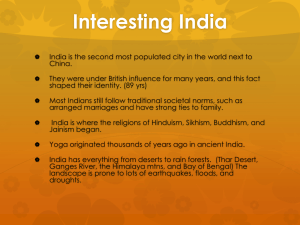KS2 Hinduism - What do Hindus believe about God?
advertisement
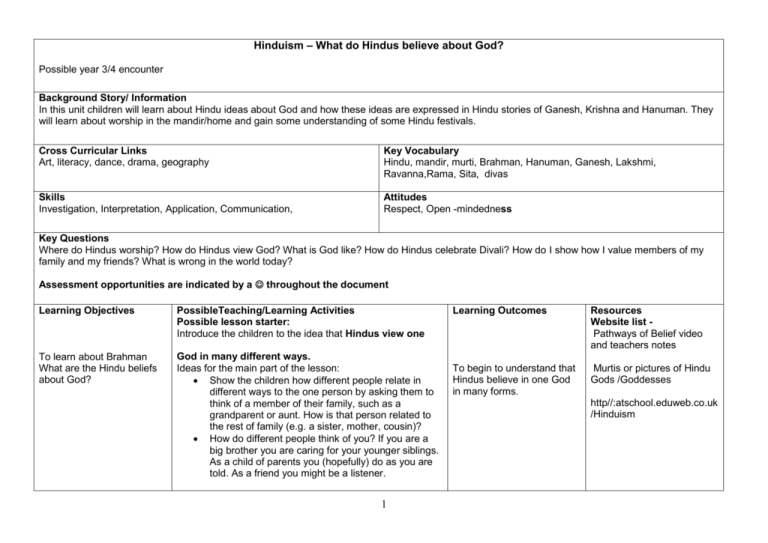
Hinduism – What do Hindus believe about God? Possible year 3/4 encounter Background Story/ Information In this unit children will learn about Hindu ideas about God and how these ideas are expressed in Hindu stories of Ganesh, Krishna and Hanuman. They will learn about worship in the mandir/home and gain some understanding of some Hindu festivals. Cross Curricular Links Art, literacy, dance, drama, geography Key Vocabulary Hindu, mandir, murti, Brahman, Hanuman, Ganesh, Lakshmi, Ravanna,Rama, Sita, divas Skills Investigation, Interpretation, Application, Communication, Attitudes Respect, Open -mindedness Key Questions Where do Hindus worship? How do Hindus view God? What is God like? How do Hindus celebrate Divali? How do I show how I value members of my family and my friends? What is wrong in the world today? Assessment opportunities are indicated by a throughout the document Learning Objectives PossibleTeaching/Learning Activities Possible lesson starter: Introduce the children to the idea that Hindus view one To learn about Brahman What are the Hindu beliefs about God? God in many different ways. Ideas for the main part of the lesson: Show the children how different people relate in different ways to the one person by asking them to think of a member of their family, such as a grandparent or aunt. How is that person related to the rest of family (e.g. a sister, mother, cousin)? How do different people think of you? If you are a big brother you are caring for your younger siblings. As a child of parents you (hopefully) do as you are told. As a friend you might be a listener. 1 Learning Outcomes Resources Website list Pathways of Belief video and teachers notes To begin to understand that Hindus believe in one God in many forms. Murtis or pictures of Hindu Gods /Goddesses http//:atschool.eduweb.co.uk /Hinduism Show pictures of Hindu deities- ask what aspect of the one god Brahman do you think this represents Get them to draw a picture of one of the forms of the Hindu deity and say how this help Hindus understand what God is like. Children could also draw a family member e.g. Mum showing her with many arms to indicate all the many things she does to help us To learn about Ganesh What do we know about him? Possible lesson starter: Read a story about Ganesh which illustrates his approachability e.g. His love of sweets and jellies How do Hindus feel about Ganesh? Ideas for the main part of the lesson: Lots of Hindus have shrines to Ganesh in their home The murti is treated like a person and a friend and is offered flowers, water, incense sticks and fruit Hindu children often pray to Ganesh to help them at school Children write a prayer or a list of things they would like help with at school. Who would you ask? To learn about the importance of Krishna to Hindus Possible lesson starter: Read a story of Krishna e.g. Krishna the butter thief, this shows Krishna as a naughty child and makes it possible for Hindu children to identify with him. Or show a picture of Krishna and ask children what questions they have about him. Ideas for the main part of the lesson: Answer questions about Krishna. Hindus believe that when there is trouble in the world the God Vishnu will come to earth. Krishna is one form of Vishnu Ask children if Vishnu came to earth what would he want to put right today? Draw or write their response 2 To describe how Ganesh is revered as God by Hindus Children can begin to describe why Krishna is important to Hindus The gift to the child Puja for Ganesh To learn about worship in the mandir Possible lesson starter: Show pictures ask the children to think, pair, share questions about a picture inside a Mandir. E.g. Priest in the temple from PCET Hinduism photo pack and activity book Children can describe how Hindus worship in the Mandir PCET Hinduism photo pack and activity book Ideas for the main part of the lesson: Children share their questions/ideas. Virtual tour of Mandir (Neasden) Make a fact sheet for fellow pupils visiting the Mandir –what should they be aware of, what should they look out for. To learn about the festival of Rakshabandan and its significance for Hindu families Possible lesson starter: Show a picture of a brother and sister. Talk about family relationships. How do you care for your siblings? How do you show this? Describe how Hindus celebrate Rakshabandan Identify relationships that are important to them Ideas for the main part of the lesson: Rakshabandan is a Hindu festival celebrated in July or August, a time of family celebration when sisters give rakis (bracelets) to their brothers to show them they love them. Make a raki, out of plaited threads and give to someone in the class to show your regard for them. In order not to leave anyone out do a circle time hand over the rakhi to the person on your left and say something nice about them. To learn about the festival of Divali and its meaning for Hindus Possible lesson starter: Tell the story of Divali- what did children find interesting, puzzling, exciting etc Why might this story have special meaning for Hindus? What meaning might this story have for today, 3 Describe how Hindus celebrate Divali Identify what is wrong/ good /evil in the world today Identify how light is used as a symbol in the Story of Rama and Sita and to welcome Lakshmi. Story Books about Divali Ideas for main part of lesson: Express ideas in various ways e.g. art ,drama , dance Re-tell the story in various ways- shadow puppets, masks etc and/or make a mask of Ravanna and attach to this evils in the world today (use newspaper cuttings /words /pictures) Point out that the ten heads illustrate how difficult it can be to overcome evil. Think of opposite words that illustrate good and evil and display on dark /light backgrounds e.g. anger/ gentleness / love /hate Learn how Hindus celebrate Divali in their home e.g. cleaning home, preparing special food, lighting divas, Divali cards, presents, new clothes, fireworks ( to chase away evil) rangoli patterns ( made to celebrate the beauty of Laksmi ) Divali is the start of a New Year for Hindus when the goddess Lakshmi is especially remembered. Hindus hope that she will visit heir homes at Divali. Lights are used along the garden paths and in the windows to remember how Rama and Sita were welcomed home and to welcome the Goddess Lakshmi to Hindu homes. Create an experience of lit divas in the classroom and ask children to thought shower words about feelings associated with the spreading of light. Make a divali card. Make sweets/ rangoli patterns/divas etc ( for a day rotate activities around different classrooms) Create a mind map of what you have learnt about Divali 4 Make links with other experiences of light being used as a symbol Assessment Opportunities I can identify the importance of murtis (statues) of the Hindu gods /goddesses to Hindus and say how they show the different characteristics of God. I can begin to describe why Krishna is important to Hindus. I can identify what is wrong in the world today. I can identify the significance of Divali for Hindus. 5
